Migration experts visit new refugee resettlement model in Brattleboro
Latin America delegates hear how local effort is breaking new ground
July 28th, 2022
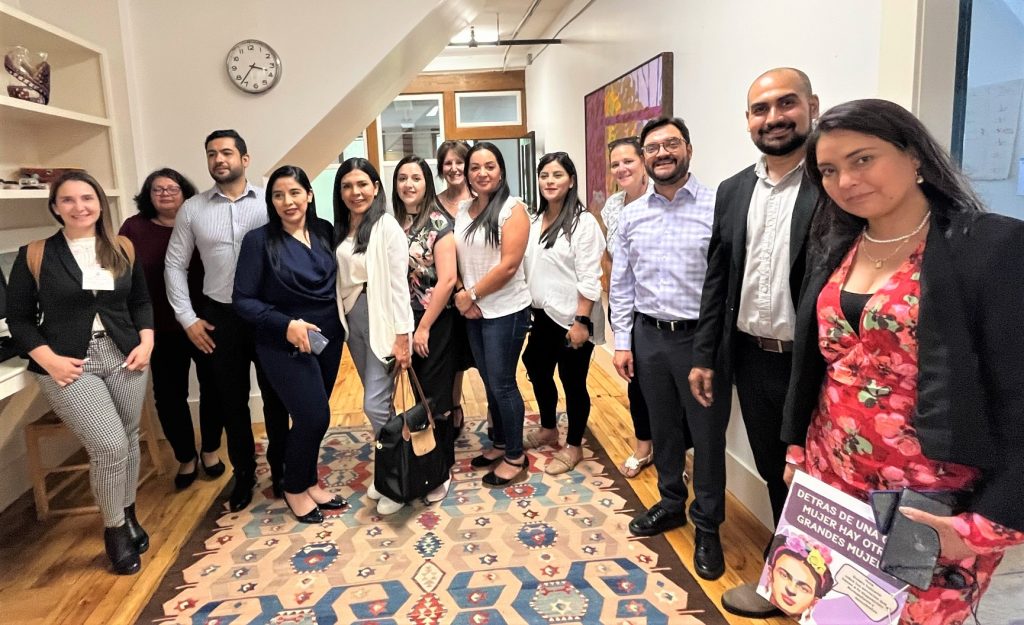
BRATTLEBORO, Vermont—A U.S. State Department-sponsored delegation of 10 migration professionals from Central and South America came to Brattleboro recently to learn about a landmark program that is changing the paradigm for refugee resettlement in the United States.
As part of the International Visitors Leadership Program (IVLP) administered by World Learning, the delegation included representatives from government and non-governmental organizations in Colombia, Costa Rica, Ecuador, Guatemala, Honduras, Mexico, Paraguay, and Venezuela.
The theme of their month-long fact-finding tour, which takes them throughout the United States, is Migration in the Americas: A Regional Project for the Western Hemisphere. One of the State Department’s goals for the program—to explore public-private resettlement programs—brought them to Brattleboro.
Since January, southern Vermont has welcomed more than 100 refugees from Afghanistan through a unique partnership between Ethiopian Community Development Council (ECDC), World Learning/School for International Training (SIT), and Brattleboro Development Credit Corporation (BDCC). This is only the second refugee resettlement location in Vermont and the largest resettlement in a rural area of the state.
In less than six months, 103 of the 104 new Vermonters have found long-term housing, 80 percent of all job-seekers are employed, and the adults are enrolled in critical English-language and cultural orientation classes.
“Based on what we’ve heard from ECDC, as well as co-sponsorship advocates nationally, the success we have had here is unparalleled,” Joel Colony, vice president for external engagement at World Learning, told the IVLP delegates.
Breaking new ground
The extraordinary results are credited to short-term housing provided to all incoming refugees on the SIT campus, and ECDC’s community co-sponsorship approach in which seven to 10 local residents team up to support newly arrived refugees. More than half of the Afghan families who have found permanent housing have done so through direct assistance from the co-sponsorship teams.
This community co-sponsorship model also relies on participation from local organizations, including churches and service organizations, that help weave together a safety net for refugees, many of whom are emerging from traumatic circumstances and have left behind homes and loved ones in their bid for safety and security.
Founded by Ethiopian immigrants in 1983, the local lead agency, ECDC, is one of nine refugee organizations that contract with the U.S. government for resettlement, and the only one that is led by immigrants, according to Joe Wiah, director of the ECDC Multicultural Community Center in Brattleboro.
An SIT alum who worked with refugees in Africa for 30 years, Wiah was named to the ECDC position last fall, just a few months before the first Afghans began arriving. “We quickly learned that the kind of refugee resettlement that was happening in other parts of the country—where an agency does almost everything—was not going to work here,” he told the IVLP delegates.
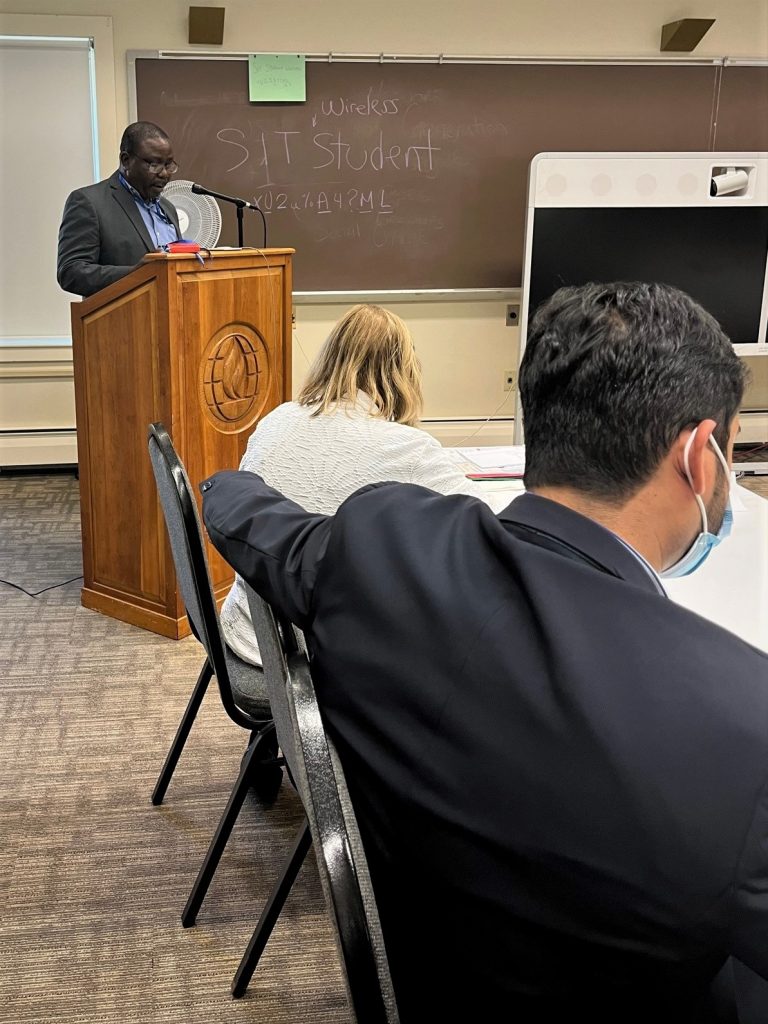
To bring this idea to town managers, police, and policymakers in a rural area that was new to refugee resettlement, Wiah said, “we needed organizations that had been here for decades to be part of the process. There was also SIT, an academic institution with long international experience with academic affairs and teaching English to beginners.”
Dr. Sophia Howlett, president of SIT, said the partnership was a logical fit. SIT’s founding organization, the Experiment in International Living, participated in refugee education in Southeast Asia starting in 1979 as part of the largest refugee resettlement effort in history. Today. SIT offers undergraduate and graduate programs that focus on migration, including a master’s degree in Jordan and Uganda in humanitarian assistance and crisis intervention.
“We would like to connect our programs with what we’re doing here on campus so we can provide support on how to work with refugees,” Howlett told the delegates.
Building a network of support
Although there are a handful of other rural resettlement efforts in the United States, this is the only one that includes a formal partnership with a higher education institution. When they arrive, refugees live in temporary housing on the SIT campus for up to 90 days and enroll in SIT’s New Vermonter Education Program to learn English and U.S. cultural norms.
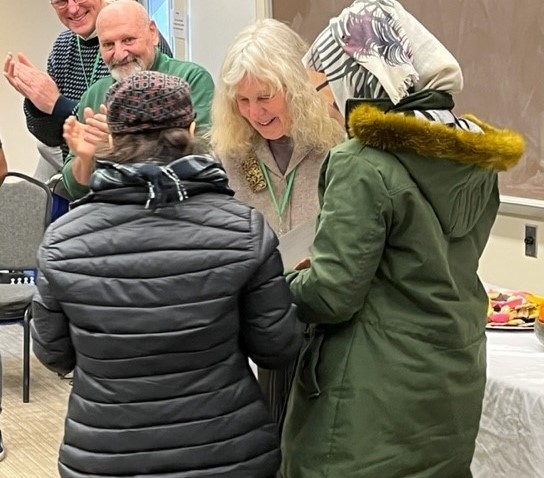
SIT’s unique approach to language learning also helps to ease learners into a new culture. “People bring the richness of their language and cultural histories, and that should be used in a language class,” said Dr. Leslie Turpin, chair of the MA in TESOL program at SIT. Turpin was part of a group of 12 SIT professors, most of them retired or emeriti, who volunteered to teach classes on campus while the Afghan refugees were living there.
Through classes, shared meals, and short-term housing, the first wave of Afghan refugees had an opportunity to bond with each other and with local residents, building resiliency and a sense of community. More than 200 community members and 17 local churches and service organizations are volunteering with the resettlement effort.
I was expecting to go to a hotel or temporary housing, but fortunately we had the chance to come here to SIT. I was amazed about the services we received.
Ebrahim
Ebrahim worked with the U.S. Embassy in Kabul before the Taliban re-took control of Afghanistan in August 2021. He hid in Kabul for two months before fleeing with his wife and two young children to Vermont via Islamabad, Doha, Philadelphia, and a military base in New Jersey.
“I was expecting to go to a hotel or temporary housing, but fortunately we had the chance to come here to SIT. I was amazed about the services we received. To be honest, I didn’t expect to receive meals and food. I expected I would have to go to work to get food. It wasn’t like that. ECDC and SIT and World Learning advocated for us, and we had the chance to receive services that helped us to resettle smoothly,” he said.
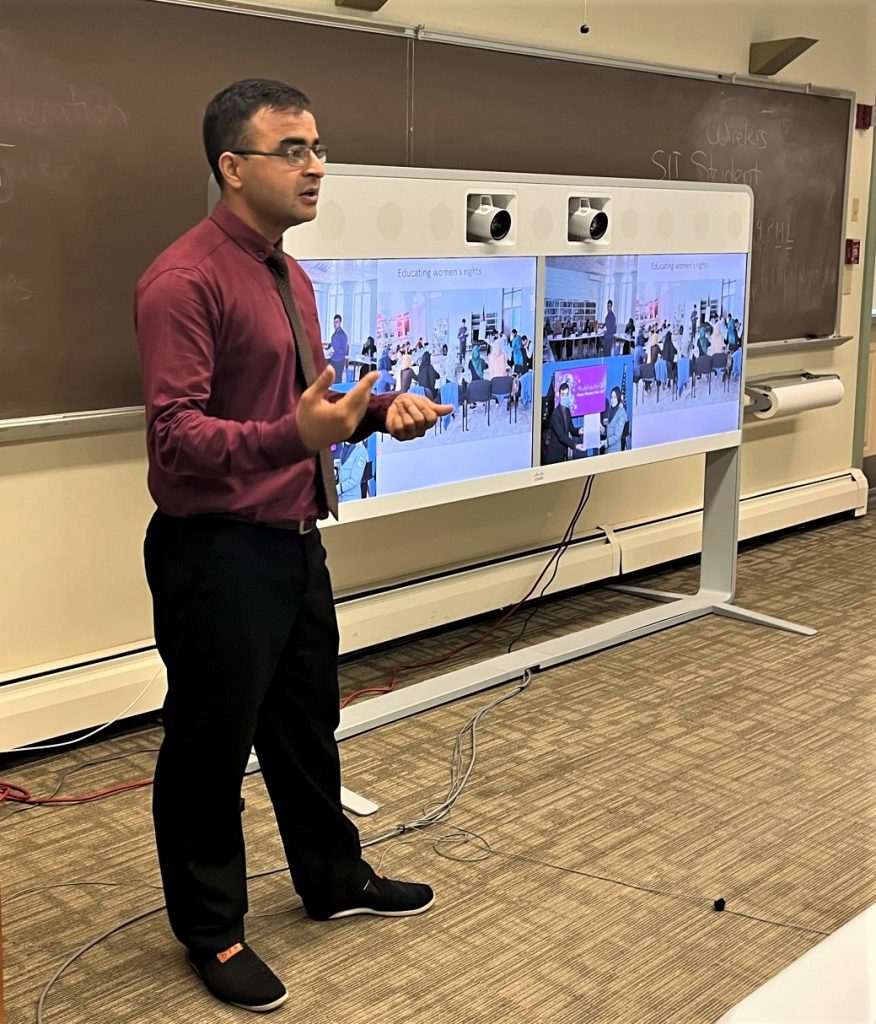
Today, Ebrahim's family has an apartment and a car. He works for ECDC and is also interested in helping local residents understand more about Afghanistan and the backgrounds of their new neighbors.
“The initiatives that ECDC and SIT took to resettle refugees—the co-sponsorship, the families and volunteers who helped us even beyond the core services that ECDC provided for us, the advocacy by World Learning, SIT, and ECDC—all of it has made support for receiving refugees so high here,” he told the IVLP delegates.
Johanna Rodriguez Tencio, a regional manager with Costa Rican Immigration Police, commented: “It’s clear that wherever possible, government and civil society need to come together to support and guide human mobility.”
Another delegate, Vanessa Lizeth Bolanos Yepez, immigration coordinator at Quito’s airport in Ecuador, asked if there is special support for mothers with infants and young children.
Turpin said two of the most well-attended classes on campus brought health professionals from the local hospital to speak directly with the women, and ECDC continues to work closely with the hospital to provide culturally sensitive support.
ECDC assigns each family a caseworker, who assist them through the resettlement process, including accessing appropriate federal and state benefits, and works with them to find answers to myriad questions and challenges.
The organization has opened a new community center near downtown Brattleboro. English classes are taught there as well as at some job sites that employ groups of refugees. The center also has a sewing room where women can gather to make traditional clothing and learn to offer tailoring services to the community.
The center also houses bicycle safety and repair classes for the many Afghans who rely on bicycles as their only means of transportation.
A group of Afghan young people has received a small grant to run a week-long summer camp where Afghan children can be exposed to their language and culture and non-Afghan children can learn more about it.
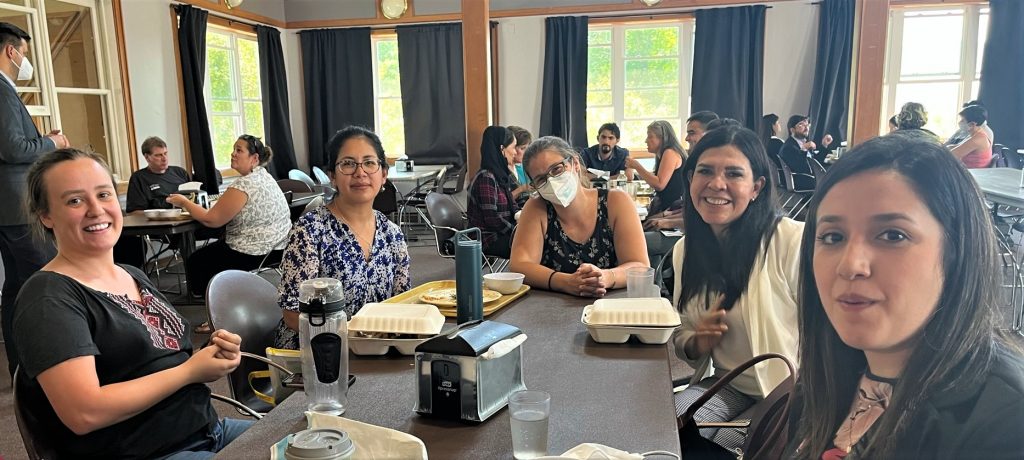
A new community blooms
Throughout town, there are signs that the resettlement efforts are taking root. Many downtown businesses still have posters in the window saying “welcome” in English, Dari, and Pashto—the result of an impromptu effort among several Afghans and their Vermont friends during the Nowruz holiday in March.
Five Afghan artists who were part of the famous Art Lords muralists in their home country are commissioning public art projects and working with the Brattleboro Museum and Art Center on an exhibit to recreate and display murals that were destroyed by the Taliban.
Most communities are not this way. What is the essence of your community to be so hospitable?
Carlos Alejandro Soberanis Toledo, Guatemala City urban planner
At Brattleboro Union High School, a young robotics champion who arrived from Afghanistan four months ago speaking little English delivered the commencement address and graduated with honors. And last spring, school garden coordinators collaborated with a local farm to grow two culturally relevant crops and include Afghan dishes in student cooking projects.
What makes this area so welcoming, Guatemala City urban planner Carlos Alejandro Soberanis Toledo wanted to know. “Most communities are not this way. What is the essence of your community to be so hospitable?”
“With the presence of World Learning, this town is used to interfacing with other cultures," responded local resident Rick Wheeler. “As a resident of the Brattleboro area, I am tremendously proud.”
BDCC Programs Director Jennifer Stromsten concurred. “Here in this tiny, tiny town in this tiny, tiny state, we are doing something that is remarkable for the U.S.: We are welcoming refugees into a rural community. This is a ground-up, not a top-down initiative.”
With a shrinking and aging population, Brattleboro has a declining workforce, Stromsten said. In the past decade, the county lost 20 percent of its labor force. “But we have a lot of jobs—the remaining manufacturing sector is very strong. What we lack is people.”
Here in this tiny, tiny town in this tiny, tiny state, we are doing something that is remarkable for the U.S.: We are welcoming refugees into a rural community.
BDCC Programs Director Jennifer Stromsten
Describing the region as progressive and "politically forward," Stromsten also noted that the area lacks diversity. “We have not benefited from the diversification that America, in general, has benefited from, but we need to, because the American labor force is more multilingual and multi-ethnic every day.”
For those reasons, BDCC began to focus on migration as one solution, even before the Taliban takeover of Afghanistan. “We knew we could do this with SIT and all of the volunteers and professors within this organization, and the larger volunteer network of citizens and knowledgeable people who have a shared cultural expectation that opening ourselves to the world is a good thing.”
Stromsten admits there are still challenges, but believes that by pulling together the community will surmount them. “Together, we are developing a model. What we’re doing here can work all over the place.”
"A remarkable aspect is the positive attitude of the host community in Vermont," said Eloisa Elizabeth Ulloa Lucero, an immigration control analyst with the government of Ecuador. "So many of them work as volunteers to offer help to the refugee citizens. Getting to know this place was an excellent experience."
_________
The U.S. Department of State administers the IVLP in cooperation with a group of nonprofit organizations based in Washington, D.C., including World Learning. More than 500 IVLP participants have become heads of state or government and thousands of others have become leaders in their respective fields.
